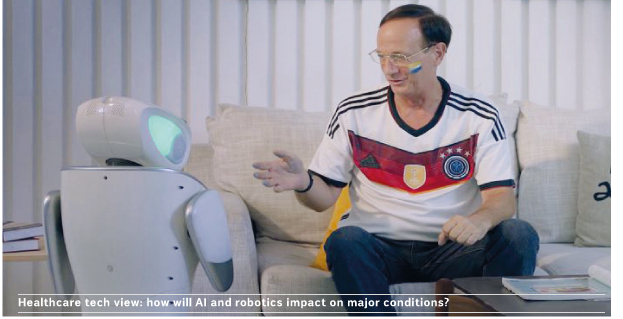With healthcare technology developing rapidly, how will it impact on the major conditions? Is complete takeover or a supporting role the best bet?
As technology explodes in so many industry verticals, healthcare is, most of the time, a puzzle that needs more unveiling and continued experimenting.
Healthcare, as opposed to other sectors, is not a straightforward cut. It is a truly multi-faceted discipline that includes traditional medicine, medical professionals, diseases, patients, behaviours, and systematic issues to name a few features of the complex puzzle. If you are trying to bring innovations and emerging technologies to address all or a few of these facets, it is not an easy task.
The future is here. Robotics and Artificial Intelligence (AI) may fill the gaps. You can witness the overwhelming facts, such as ageing populations straining the healthcare systems. As a result of this, we don’t have enough people in adult social care to provide the level of care needed by patients.
AI and Robotics are making advances across the healthcare industry, from genetic testing and robotic surgery to cancer research and data collection. In dermatology AI is already used in practical terms where it is used to detect skin cancer through an experimental mobile version of it by medical professionals.
Many questions still prevail; are we ready to hand over life and death decisions to the machines? Can personal care bots take over from human caregivers? These are only a few of many major questions that face us right now.
One of the most difficult challenges in healthcare innovation is the application of solutions in clinical settings and day to day life. Having said that, I believe that robotics can assist with many tasks and alleviate the overstraining in healthcare delivery. Assistance with scrutiny and patient priority assessments in emergency services, delivery of medications throughout hospitals floors and medication remainders to improve adherence for patients are clearly possible right now.
Other types of interventions can also be augmented and automated; tracking health remotely and interaction with vocal and facial recognition are realities today. Robotics even allow humans to programme them for multifunctional and personalised health programmes.
In conclusion, many experts agree that robotics and AI will not take over healthcare any time soon because the human factor is still important. A testimonial from a real elderly patient showed, “robots cannot really replace humans because they don’t give you hugs and don’t give you the feeling of being close to someone”.
Key Points
- Healthcare is a complex sector making innovation no easy task
- AI and robotics are already proving their worth in healthcare through disease-detection algorithms and with genetic testing
- Applying tech solutions in clinical settings is a difficult job
- Healthcare tech will not take over the sector but can play a supportive role








